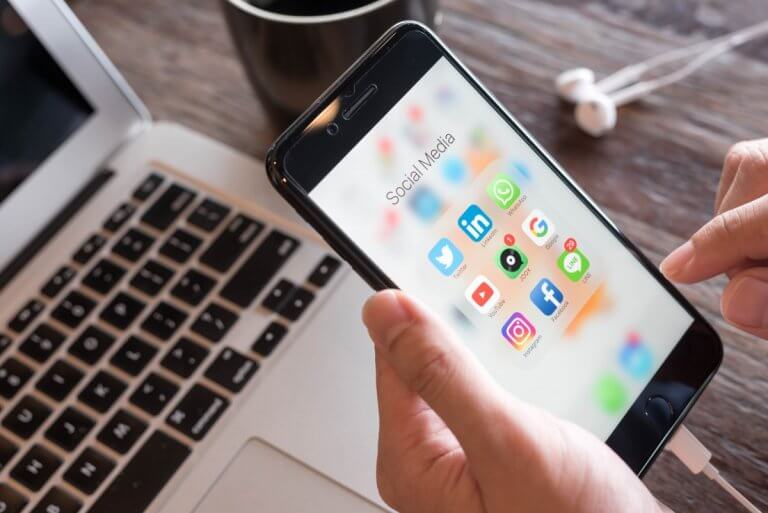
So much of our lives are now online and it can be hard to know how to switch off. From Facebook events for a big weekend to Instagram posts of your flat-family night in; social media often defines our student experience – but how do we know when it goes too far?
At one time or another, we’ve all sworn to have felt the buzz of a phone call or the ding of a notification only to look at our phone and see a blank screen – a phenomenon known a ‘Phantom Vibration Syndrome’ (yes, it’s a real thing), this is indicative of how intrusive social media can be.
Look around your uni campus at lunch and I bet you can count the people having an actual conversation with their friends on your fingers while everyone else is absorbed in the latest news feed updates.
Social media is undoubtedly a big part of the student experience, from connecting with new friends on Facebook to updating your Snapchat story – and there’s nothing inherently wrong with that.

Social media can help you connect – but at what cost? Source: Shutterstock
Connecting with friends online is a good way to keep up-to-date with what your group are doing, as well as to find cultural events in your new home and keep in touch with friends of old. It can bring you closer to those both near and far, and ultimately enhance your university experience.
But what happens when social media stops being a social enhancer but begins to become a social dampener?
After spending all morning flicking through Instamodels’ gym selfies, watching your coursemates’ Snapchat story of a night out or becoming overwhelmed with online messages and invites, it can become hard to find time to appreciate the things that are right in front of you.
Often creating a negative spiral of comparisons to beautiful ‘candid’ pictures you see online, living through the lens of likes and comments can lead you to question and doubt the validity of your life.
The truth about social media platforms is that they’re made to draw you in. That excited buzz you get when that little notification bubble pops up. The obsessive feeling that you should check how many likes your new Instagram has. The disappointment when you see the ‘read message’ without a reply. Yep, we all get it – and it’s by no mistake.

Can’t unglue yourself from your phone? It might not just be because of your narcissism. Source: Shutterstock
In fact, these apps are specifically-designed to make us feel like this. Clever psychology is implemented to hack our brains and make us into tweet-happy dopamine fiends, often causing us to forget the wider world around us.
And, unsurprisingly, these apps are incredibly good at it. Millenials spend an average of six hours on social media a week, totalling an entire day every month, according to a recent report.
Think about how many times you’ve paused a real life conversation to tend to a buzz in your pocket; how often have you taken a picture only to daydream about the possible captions; and, when was the last time you simply enjoyed a beautiful view or delicious meal, without having to upload it online?
https://twitter.com/tsetianto/status/1010863734275731456
When we’re surrounded by other people all acting this way, it becomes even more entrenched in our daily lives. Students are notoriously social and connected with digital living, so of course, social media is going to play a part in our lives.
It’s not uncommon to see people on campus crossing roads while absorbed in their phone, spending hours scrolling through Facebook while in the library or FaceTiming friends from the other side of the world.
These seemingly innocent acts can quickly manifest into something a lot darker thanks to the concept of ‘Herd Mentality’. While we all think, and even attest to the fact, we are individuals, studies show we are indefinitely influenced by those around us.
And, in a world where everyone is posting only the glossy versions of themselves on increasingly addictive platforms, the stakes of this influence can be highly detrimental.
It becomes harder to feel happy within your small, tight-knit friendship group when you’re bombarded with students partying with 50 others every time you unlock your phone. Insta-worthy romantic gestures overshadow quiet date nights and suddenly having alone time seems incredibly shameful.
Constantly surrounded by students who are also living through their online persona, it can feel like you’re alone despite being surrounded by hundreds of other students.
If you start to feel this way, there are steps you can take to cut the cord tying you to your phone. Once you’ve become part of this lifestyle, your connection to that world can feel like an extension of you. But in order to live fully in the here and now, that anchor must be lifted.
Small steps can help you break this pattern and restore vitality to your life. Start by leaving your phone behind when you run to the corner shop or grab coffee with a friend. It might feel weird at first, but you’ll soon see you never really needed your phone with you in the first place.
If all things go to plan, you’ll begin to see life beyond your screen blossom before your eyes. Rather than constantly comparing yourself to people you think are better looking, more fun and more human than yourself, you’ll start to see the joy in simply being you.
It doesn’t matter if you look good in yoga pants, have tonnes of friends or an attractive other-half. Instead what matters is whether you’re happy. While the painted smiles on social media might give you a quick buzz, focusing on genuine happiness will produce long-lasting warmth from within.
Liked this? Then you’ll love…
Keeping up with social media is making students anxious, depressed
US colleges think it’s ‘fair game’ to look at your social media accounts







